
 |
|
LEHMAN, LEE & XU China Lawyers
|
|
China Capital Markets law In The News
|
|
January 2014
|
The China Law News keeps you on top of business, economic and political events in the China. |
|
|
|
In the News |
China's Capital Markets, IPO And Institutional Investment: From Feast To Famine And Now Back Again? |
The long dark eclipse is over. The sun is shining again on China's capital markets, IPO and private equity industry. That's good news in itself, but is also especially important to the overall Chinese economy. For the last two years, investment flows into private sector companies have dropped precipitously, as domestic IPOs in China disappeared and private equity firms went into deep freeze. Rebalancing China's economy away from exports and government investment will take cash. Lots of it. Expect significant progress this year as China's private sector raises record capital and China's state-owned enterprises (SOEs) gradually transform into more competitive, profit-maximizing businesses. These are some of the conclusions of the most recent Chinese-language research report published by China First Capital. It is titled, "2014民企国企的转型与机遇", which I'd translate as "2014: A Year of Transformation and Opportunities for China's Public and Private Sectors". The key message is we expect this year's overall business conditions in China, as well as capital-raising environment, to be significantly improved compared to the last two years. We expect the IPO market to stage a significant recovery. Our prediction is that over 500 Chinese companies will IPO worldwide during this year, with the majority of these IPOs here in China. We also investigate the direction of economic and reform policy in China following the Third Plenum, and how it will open new opportunities for SOEs to finance their growth and improve their overall profitability, including through carve-out IPOs and strategic investment. SOEs will become an important new area of investment for PE firms and global strategic. SOEs we work with are all convinced of the need to diversify their ownership, and bring in profit-driven experienced institutional investors. For investors, SOE deals offer several clear advantages: scale is larger and valuations are usually lower than in SME deals; SOEs are fully compliant with China's tax rules, with a single set of books; the time to IPO or other exit should be quicker than in many SME deals. As financial markets mature in China, one unintended consequence will be a drop in activity on China's recently-established over-the-counter exchange, known as the "New Third Board" (新三板). The report offers reasons why we think this OTC market is a poor, inefficient choice for Chinese businesses looking to raise capital. China's OTC board has all the problems associated with the US OTCBB and Pink Sheets, plus some unique ones of its own. While the aims of the Chinese Third Board are commendable, to open a new fund-raising channel for private sector companies, the reality is that it offers too little liquidity, low valuations and an uncertain path to a full listing on China's main stock exchanges. Over the last three years, China has had the highest growth rate and the worst performing stock market among all major economies. In part, the long stock market slide is both necessary and desirable to bring China's stock market valuations more in line with those of the US and Hong Kong. But, it also points to a more uncomfortable reality, that China's listed companies too often become listless ones. Once public, many companies' profit growth and rates of return go into long-term decline. IPO proceeds are hoarded or misspent. Rarely do managers make it a priority to increase shareholder value. A small tweak in the IPO listing rules offers some promise of improvement. Beginning this year, a company's control shareholder, usually the owner or a PE firm, will be locked-in and prevented from selling shares for five years if the share price stays below the original IPO level. Spare a moment to consider the life of a successful Chinese entrepreneur, both SOEs and private sector. In two years, access to capital went from feast to famine. And now maybe back again. An IPO exit went from a reachable goal to impossibility. And now maybe back again. Meanwhile, markets at home surged while those abroad sputtered. Government reform went from minimal to now ambitious. 2014 is going to be quite a year. |
|
|
|
|